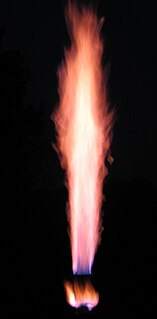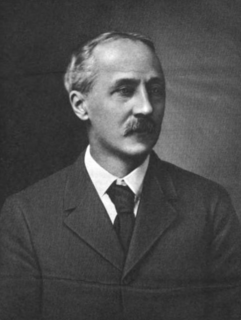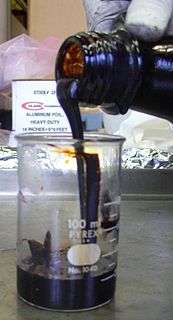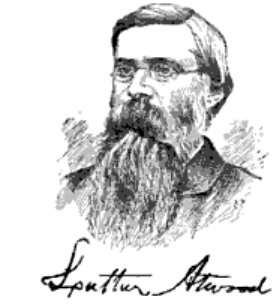
Creosote is a category of carbonaceous chemicals formed by the distillation of various tars and pyrolysis of plant-derived material, such as wood or fossil fuel. They are typically used as preservatives or antiseptics.

Coke is a grey, hard, and porous fuel with a high carbon content and few impurities, made by heating coal or oil in the absence of air—a destructive distillation process. It is an important industrial product, used mainly in iron ore smelting, but also as a fuel in stoves and forges when air pollution is a concern.

Wood gas is a syngas fuel which can be used as a fuel for furnaces, stoves and vehicles in place of gasoline, diesel or other fuels. During the production process biomass or other carbon-containing materials are gasified within the oxygen-limited environment of a wood gas generator to produce hydrogen and carbon monoxide. These gases can then be burnt as a fuel within an oxygen rich environment to produce carbon dioxide, water and heat. In some gasifiers this process is preceded by pyrolysis, where the biomass or coal is first converted to char, releasing methane and tar rich in polycyclic aromatic hydrocarbons.

Domtar Corporation is the largest integrated producer of uncoated free-sheet paper in North America and the second largest in the world based on production capacity, and is also a manufacturer of papergrade pulp.
Coal gas is a flammable gaseous fuel made from coal and supplied to the user via a piped distribution system. It is produced when coal is heated strongly in the absence of air. Town gas is a more general term referring to manufactured gaseous fuels produced for sale to consumers and municipalities.
{{Infobox Family | name = Cabot | image = | crest = | caption = | ethnicity = [[French [French Isles]] | region = United States | early_forms = | origin = Isle of Jersey | members = | otherfamilies = Lowell
Lodge
Forbes
Calderbank | distinctions = | traditions = | estate = John Cabot House
Eleanor Cabot Bradley Estate
Lewis Cabot Estate | meaning = }}

Dry distillation is the heating of solid materials to produce gaseous products. The method may involve pyrolysis or thermolysis, or it may not. If there are no chemical changes, just phase changes, it resembles classical distillation, although it will generally need higher temperatures. Dry distillation in which chemical changes occur is a type of destructive distillation or cracking.

Godfrey Lowell Cabot was an American industrialist who founded the Cabot Corporation.
Coal gasification is the process of producing syngas—a mixture consisting primarily of carbon monoxide (CO), hydrogen (H2), carbon dioxide (CO2), natural gas (CH4), and water vapour (H2O)—from coal and water, air and/or oxygen.

Tar is a dark brown or black viscous liquid of hydrocarbons and free carbon, obtained from a wide variety of organic materials through destructive distillation. Tar can be produced from coal, wood, petroleum, or peat.

Ball Corporation is an American company headquartered in Broomfield, Colorado. It is best known for its early production of glass jars, lids, and related products used for home canning. Since its founding in Buffalo, New York, in 1880, when it was known as the Wooden Jacket Can Company, the Ball company has expanded and diversified into other business ventures, including aerospace technology. It eventually became the world's largest manufacturer of recyclable metal beverage and food containers.

Koppers is a global chemical and materials company based in Pittsburgh, Pennsylvania, United States in an art-deco 1920s skyscraper, the Koppers Tower.
Cabot Corporation is an American specialty chemicals and performance materials company headquartered in Boston, Massachusetts. The company operates in over 20 countries with 36 manufacturing plants, eight research and development facilities and 28 sales offices.

The history of gaseous fuel, important for lighting, heating, and cooking purposes throughout most of the 19th century and the first half of the 20th century, began with the development of analytical and pneumatic chemistry in the 18th century. The manufacturing process for "synthetic fuel gases" typically consisted of the gasification of combustible materials, usually coal, but also wood and oil. The coal was gasified by heating the coal in enclosed ovens with an oxygen-poor atmosphere. The fuel gases generated were mixtures of many chemical substances, including hydrogen, methane, carbon monoxide and ethylene, and could be burnt for heating and lighting purposes. Coal gas, for example, also contains significant quantities of unwanted sulfur and ammonia compounds, as well as heavy hydrocarbons, and so the manufactured fuel gases needed to be purified before they could be used.
The Valspar Corporation is a manufacturer of paint and coatings based in Minneapolis, Minnesota, U.S. With over 11,000 employees in 25 countries and a company history that spanned two centuries, it was the sixth largest paint and coating corporation in the world. Valspar was founded in 1806 as a paint dealership in Boston, Massachusetts. The Valspar name emerged in 1903 as the name of a clear varnish and became the company name in 1932.

Charcoal is a lightweight black carbon residue produced by strongly heating wood so as to drive off all water and other volatile constituents. In the traditional version of this pyrolysis process, called charcoal burning, the heat is supplied by burning part of the starting material itself, with a limited supply of oxygen. Charcoal can also be produced by heating the material in a closed retort.

Friedrich Engelhorn was a German industrialist and founder of BASF in Ludwigshafen.
J. H. Hobbs, Brockunier and Company was one of the largest and best known manufacturers of glass in the United States in the 19th century. Its products were distributed world-wide. The company is responsible for one of the greatest innovations in American glassmaking—an improved formula for lime glass that enabled American glass makers to produce high-quality glass at a lower cost. The firm also developed many of the talented glassmakers that started glass factories in Ohio and Indiana.
Sam or Samuel Cabot may refer to:

Luther Atwood was an American chemist. He is known for creating new chemical products from the distillation of coal and petroleum.